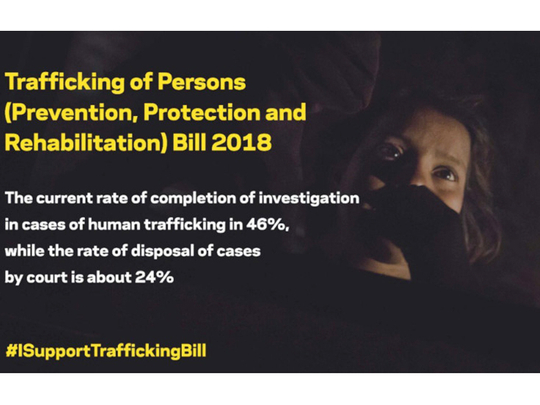
Dubai
Indians have taken to Twitter to request the country’s government to pass an Anti-Trafficking Bill during the ongoing monsoon mession of the Indian Parliament.
On Wednesday, Nobel Peace laureate Kailash Satyarthi (@k_satyarthi) tweeted: “Trafficking is the largest organised crime. It’s time to send a strong message that India will not allow this heinous form of human slavery to flourish on this sacred land. I trust your leadership PM Sh. @narendramodi to pass bill in the current session. #ISupportTraffickingBill”
Trafficking is the largest organised crime. It’s time to send a strong message that India will not allow this heinous form of human slavery to flourish on this sacred land. I trust your leadership PM Sh. @narendramodi to pass bill in the current session. #ISupportTraffickingBill pic.twitter.com/QiowtTFJVP
— Kailash Satyarthi (@k_satyarthi) July 18, 2018
Asking parliamentarians and parties to look beyond politics, @k_satyarthi added: “I urge all opposition parties, parliamentarians and Ngos(Non-governmental organisations) to come forth and extend their full support to ensure its smooth passage in this session.”
Just within an hour, #ISupportTraffickingBill started trending in India as tweeps united to support the cause. Many tagged Indian Prime Minister Narendra Modi.
@PragatiSingh94 wrote: “We have no dearth of cases that talks about the emergency our country is facing in terms of security and safety of women and children #HumanTrafficking being third organised crime in the world should not be overlooked now #iSupportTraffickingBill @k_satyarthi @PMOIndia @narendramodi”
We have no dearth of cases that talks about the emergency our country is facing in terms of security and safety of women and children #HumanTrafficking being third organized crime of world should not ne overlooked now #iSupportTraffickingBill @k_satyarthi @PMOIndia @narendramodi
— Pragati Singh (@PragatiSingh94) July 18, 2018
According to data released in 2017, by India’s Ministry of Women and Child Development, almost 20,000 women and children were victims of human trafficking in India in 2016.
The Kailash Satyarthi Children’s Foundation (@KSCFIndia) tweeted: “Everyday thousands of girls are pushed into sexual slavery at the cost of their childhood and their safety. ....We must pass this bill and ensure the safety of our children #isupporttraffickingbill”
This bill will give thousands of children a chance to have a childhood again. It is a chance for India to rid itself of the menace of trafficking. pic.twitter.com/67D40kktPI
— Satyarthi Foundation (@KSCFIndia) July 18, 2018
Almost 80 per cent of all worldwide trafficking is for sexual exploitation, with an estimated 1.2 million children being bought and sold into sexual slavery every year. According to a report published by the US Department of State, India is the source, destination and transit country for human trafficking who then get involved in forced labour and sex trafficking. They are then forced into prostitution, forced marriage, and domestic work.
Poverty, uneven employment, gender discrimination, harmful traditional and cultural practices and lack of proper policy implementation are some of the causes of human trafficking in India.
Tweep @PankajHimalaya posted: “The Trafficking Bill 2018 addresses one of the most pervasive yet invisible crimes affecting the most vulnerable people especially women and children. #ISupportTraffickingBill
The Trafficking Bill 2018 addresses one of the most pervasive yet invisible crimes affecting the most vulnerable persons especially women and children.. #ISupportTraffickingBill
— Pankaj Kushwal (@PankajHimalaya) July 18, 2018
Many Twitter users said tougher laws and immediate action were imperative.
@upspatil tweeted: “It is a heinous crime. Human trafficking should be punishable with death penalty.
#iSupportTraffickingBill
— RAVAN TIMES (@upspatil) July 18, 2018
Its a heinous crime. Human trafficking should be punishable with death penalty.
And @deepanker70 added: “Every hour, eight children go missing. I want to protect my country’s future, so #iSupportTraffickingBill.”
Every hour 8 children goes missing. I want to protect my country's future, so #iSupportTraffickingBill
— Deepanker Verma (@deepanker70) July 18, 2018
#iSupportTraffickingBill every hour 8 children go missing, most likely to be trafficked into child labour and sexual exploitation. We cannot allow this to be the reality of our country. That's why I support the trafficking bill @CRY @k_satyarthi @Manekagandhibjp
— Gajendra Nautiyal (@GajendraNautiy2) July 18, 2018
Tweep @thomasabhishek1 like many others, was thankful that social media was finally being used for a positive cause and not the usual constant political bickering that seems to have become common in the country. He wrote: “Atleast there are some who are doing well for a positive change! #isupporttraffickingbill”
Atleast there are some who are doing well for a positive change!
— Abhishek thomas (@thomasabhishek1) July 18, 2018
#isupporttraffickingbill https://t.co/qzX2SqJ2L1












